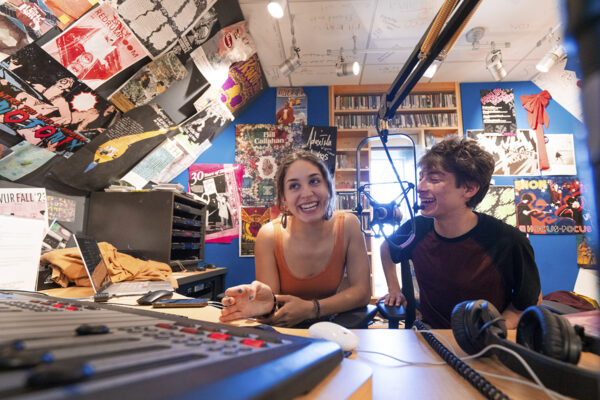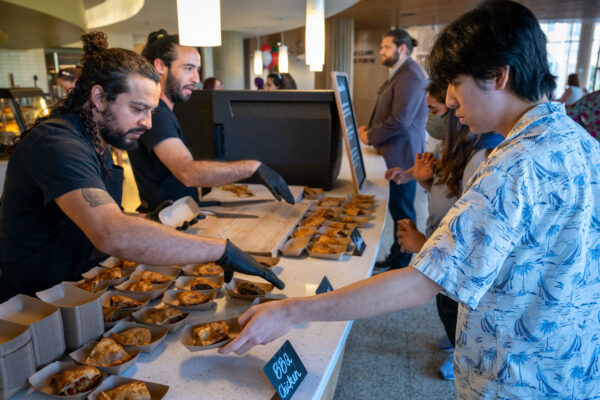It’s a sunny Sunday, and the WashU Bear Cubs Running Team is warming up on Mudd Field at Washington University in St. Louis. Up first: butt kicks. Then jumping jacks. And finally, Frankenstein walks. Ten-year-old Carter Hoffman extends his arms and legs and marches like a monster.
“Everyone be like Carter,” says coach Molly Morton, a runner for the WashU track and cross-country teams and a junior studying psychology in Arts & Sciences. “Good job, everyone! Now grass scoopers!”
Now in its ninth year, the Bear Cubs Running Team serves children with autism and other physical and developmental disabilities as well as their siblings. Every Sunday, 100 “cubs” and their coaches meet at WashU for stretching, games and socializing. Today is one of the team’s last practices before the season ends April 21 with a big race at Francis Olympic Field. Carter is ready.
“I used to be a rookie; now I am a veteran of running,” boasts Carter, who has won races in the 100 meters, 400 meters and the mile.
“Carter, you are so fast,” agrees Carter’s coach, Rishi Sharma, a former varsity runner who graduated in December with a biology degree, in the neuroscience track, from Arts & Sciences. “I need you to keep me in shape.”
The Bear Cubs Running Team was founded in 2015 by varsity runners (and now alumnae) Annie Marggraff and Maisie Mahoney as a way for cross-country and track athletes to share the joy of exercise with children with autism and other physical and developmental disabilities. Since then, the club has nearly tripled in size and now offers two sessions every Sunday. Each cub is paired with a student coach for the entire season. Most, but not all, of the coaches are student-athletes.
“You don’t need to be a runner; you just need to be committed,” said Bear Cubs President Marlee Fradkin, who runs track and cross-country and is majoring in political science in Arts & Sciences. “We make it very clear to all of our volunteers — whatever you did on Saturday night, you need to be here Sunday, ready to go. Kids are counting on you.”




Volunteers receive some training and often consult with parents about a child’s specific needs. But primarily, they learn from the children themselves, said coach Laura Brambilla, a volleyball player whose first cub was nonverbal.
“It was all about spending time with him and observing how he viewed the world and what he responded to,” said Brambilla, a junior studying biology in Arts & Sciences. “Our focus is never about getting the kids to run or participate in all of the games. It’s about meeting them where they are at.”
So while most cubs are playing Duck Duck Goose, others are walking in the shade with their coaches or tumbling in the grass. Eric Hoffman, Carter’s father, said the one-to-one ratio is key to the program’s success.
“This is what we look forward to every Sunday,” said Hoffman, who continues to exchange postcards and letters with past coaches. “Carter looks up to these coaches and has really been challenged by them. He has an interest in medicine now because of his pre-med coaches.”
Hoffman said the parents also benefit. On this day, dozens of parents are resting on blankets and in folding chairs, snapping photos and sharing snacks.
“This is a support system as much for the families as it is for the kids,” Hoffman said. “We all have our own challenges, our own families. And this is a place where we can learn about different programs and resources from each other.”
The coaches benefit, too. Many miss their own siblings, and the weekly practices are a fun way to play big brother or big sister. The club also strengthens the bond among teammates, Fradkin said.
“Coach Jeff Stiles (head coach for track and cross-country) now takes recruits to Bear Cubs practices because it demonstrates the culture of our team — that we want to help each other and we want to help the people around us,” Fradkin said. “Does Bear Cubs make us a better team? I would say yes.”
Given the cross-country and track programs’ string of successes, it’s hard to argue. In March, the Bears women’s team took second place in the Division III Indoor Track and Field Championships.
After a round of sharks and minnows and another lap around Mudd Field, Morton herds the group in for a cool down. She offers each child a chance to pick an exercise. One child wants to do jumping jacks. Another child picks sit-ups.
“Carter, you must have an idea,” Morton says.
Carter grabs the bullhorn: “Everybody spin for 15 seconds.”
The cubs twirl round and round, finally collapsing on the ground. After some bird dogs and toe touches, Morton gathers the cubs for a final cheer.
“Three, two, one. Bear Cubs!”
For more information, join the Bear Cubs Running Team mailing list.




